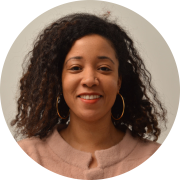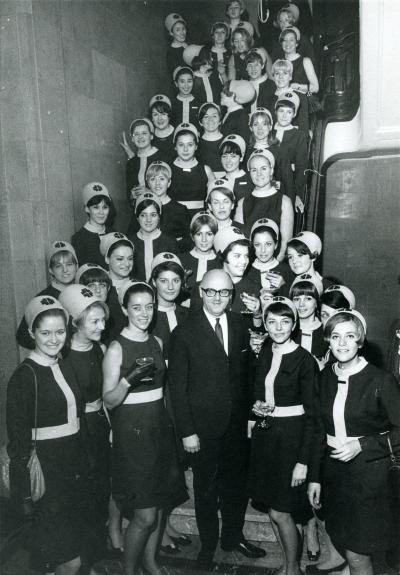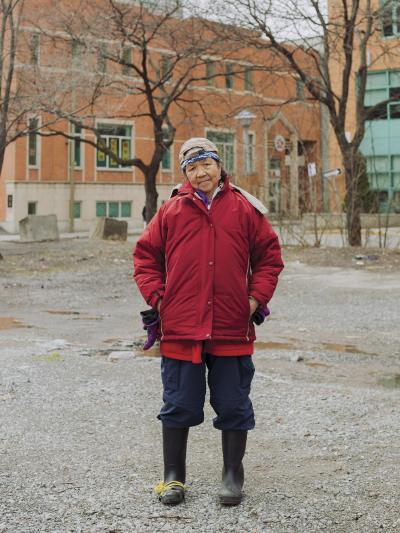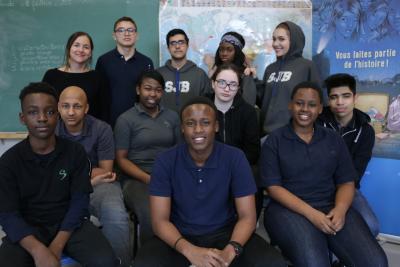In 1981, Dary Chan left a refugee camp for Montréal with her husband and six children, including four who were adopted. Her journey has been marked by determination and desire to build a better life.
As part of the Women’s Stories of Immigration project, the MEM – Centre des mémoires montréalaises met with women who have settled in Montréal from elsewhere to hear about their experiences. Our Stories series maps unique life paths that intersect across the city, shaping its history.
—
On September 19, 2018, the Centre Khemara, dedicated to the transmission of Khmer history and culture, was joined by monks from Canadian Buddhist temples and Canadian Cambodians in an event to commemorate the victims of the Cambodian Genocide of 1975 to 1979.
Between 1979 and 1982, approximately 7,000 Cambodians arrived in Canada. Following the invasion of Cambodia by Vietnamese troops in 1978 and the fall of the Khmer Rouge regime in 1979, a massive number of Cambodians left the country.
Family reunification
Dary Chan - camp
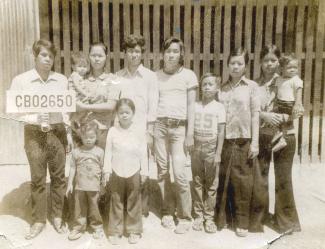
During this difficult period, Dary Chan worked in the rice fields for three years in Cambodia. She was then sent to a refugee camp in Thailand. She stayed at the camp for a year, until she discovered that her mother, sisters, and brothers were living in Canada. In 1981, she landed in Montréal at the age of 26, sponsored by her father (he had settled in Montréal in 1975). With her were her husband, her two sons, and the four children she had adopted in the refugee camp. “When I was leaving the refugee camp, I took four minors with me—nephews on my husband’s side,” explains Dary. “Once they were in Montréal, they all started school.”
The family was a beneficiary of the 1976 Immigration Act, which recognized refugees as a special humanitarian class of immigrants (as defined in the United Nations’ Convention relating to the Status of Refugees). Businessman Paul Desmarais helped them get settled and contributed to the rent of a three-bedroom apartment where they lived for several years. “Mr. Desmarais helped us with 200 dollars a month for the rent, for a year,” notes Dary. She had to send fifty dollars per week to the Canadian government, as reimbursement for her plane ticket.
Training and career mobility
Dary Chan - famille
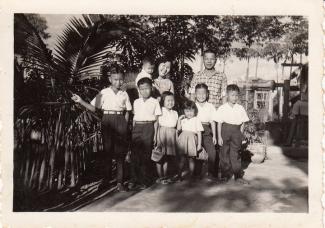
“You have to study hard if you want a comfortable life, enough money, and some kind of a place in society. And to be able to earn a living more easily than when Grandma and Grandpa arrived here,” Dary told her grandchildren. This philosophy has guided Dary since the beginning.
On arriving in Montréal, Dary worked in a clothing store for three months, ticketing merchandise. She worked days, and took evening classes at École Saint-Henri to obtain her high-school diploma. In 1986, only 41.9% of Cambodian women in Canada had joined the labour market, versus 64.6% of Cambodian men; Dary stood apart. The company where she worked was pleased with her work and asked her to work “on the floor” to arrange merchandise and work directly with clients. She then held a cashier position and, later, worked as a secretary until the business closed its doors in 1994. “I was good with numbers,” says Dary.
At the employment insurance office, Dary asked for training in computerized financial management, and the request was approved thanks to her good grades. She went on to obtain her certification at Collège de Bois-de-Boulogne. Diploma in hand, Dary sent out her résumé. In 1997, Aoura Bizzarri at the Collectif des femmes immigrantes du Québec (Le Collectif) took her on as an administrative assistant. “She chose me. I didn’t have any experience. She said that was okay. She had me write a test, and I got everything right. She chose me. ... I’ve worked with Aoura ever since,” says Dary, speaking about the organization’s job recruitment counsellor at the time.
Defying norms
Dary Chan

It was clear that Dary Chan had her own way of thinking. In 2011, she attended an interview with the Société des transports de Montréal (STM) to become a bus driver, following one of Le Collectif’s recruitment events. “The STM wanted immigrant bus drivers. You had to have a truck licence,” explains Dary. “They ended up choosing me, and they told me I had to go get the licence right away.” She would be working in a traditionally male-dominated sector. Even by 2019, only 33% of staff members identified as women, according to the Ministère de l’Éducation et de l’Enseignement supérieur. However, Dary did not pursue a career with the STM in the end, due to constraints related to mandatory evening shifts. Instead, Le Collectif offered her a position as an administrative assistant, in which she has gone on to “hold the purse strings,” just like at home.
Carrying on a family legacy
Dary Chan - famille élargie
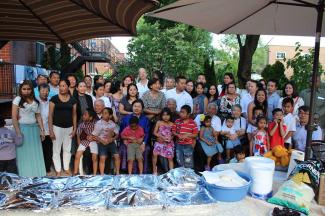
Dary has lived in Rosemont–La Petite-Patrie since 1988. She bought a house in the neighbourhood because it “wasn’t expensive.” She raised her two sons according to Khmer cultural values and Buddhist beliefs. She explains how it was back then: “When they would come home from school, it was Cambodian culture, Khmer culture. You need to respect your elders... You need to listen... You can be Canadian when you’re out of the house,” she laughs. Today, Dary is a grandmother of two and wants to pass down Khmer culture and cultivate an appreciation for it. “You can’t forget the source, where you came from ... Cambodia needs to be remembered, despite the war, despite the famine, despite all that, you need to go see your country, the country where your parents and your grandmother and grandfather were born.”
Dary Chan has achieved the better life she set out to build. And she has managed to pass down her culture through the generations and share it with the people around her.
Montréal’s Centre Khemara supports this mission, with a mandate to “promote Khmer culture among young people born or raised far from their roots, and promote sociocultural exchange between Cambodians and Montrealers of all origins.”
DORAIS, Louis-Jacques. « Les Cambodgiens, Laotiens et Vietnamiens au Canada », [En ligne], La société historique du Canada, Les groupes ethniques du Canada, brochure no 28, 2000.
https://cha-shc.ca/_uploads/5c37599e2c931.pdf
SOCIÉTÉ DES TRANSPORTS DE MONTRÉAL. « Inclusif depuis 1987. Portrait de la diversité à la STM au 31 décembre 2018 », [En ligne], Diversité.
http://www.stm.info/fr/a-propos/informations-entreprise-et-financieres/diversite
MUSÉE CANADIEN DE L’IMMIGRATION DU QUAI 21. « Loi sur l’immigration de 1976 », [En ligne], Histoire de l’immigration.
https://quai21.ca/recherche/histoire-d-immigration/loi-sur-l-immigration-de-1976
MINISTÈRE DE L’ÉDUCATION ET DE L’ENSEIGNEMENT SUPÉRIEUR. « Métiers et professions traditionnellement masculins », [En ligne], Condition féminine, 2019.
http://www.education.gouv.qc.ca/le-ministere/condition-feminine/metiers-et-professions-traditionnellement-masculins/
